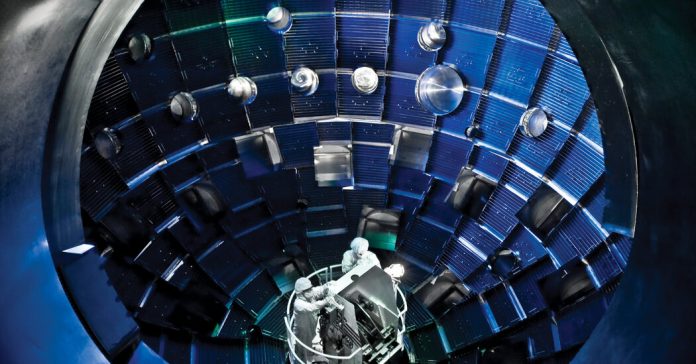Instances Insider explains who we’re and what we do, and delivers behind-the-scenes insights into how our journalism comes collectively.
Since 2000, Kenneth Chang has coated numerous information for The New York Instances — worldly and extraterrestrial. As a science reporter, Mr. Chang has stood by at NASA launch websites, ready for rockets to carry off to the moon. (They often don’t.) He has profiled a chemist with onstage ambitions. And he has spoken with specialists concerning the developments this month in nuclear fusion, the trouble to breed the solar’s energy in a lab — and what that may imply for the way forward for power.
Mr. Chang holds a bachelor’s diploma in physics and labored on a Ph.D. within the topic earlier than he determined to turn into a reporter. That have, he says, helps him parse difficult ideas for readers, or a minimum of provides him an thought of precisely what he needs to be asking whereas on the job.
In an interview, Mr. Chang spoke about how he stays knowledgeable on his beat, the enjoyment he nonetheless feels from reporting on a brand new discovery and the way he breaks down superior ideas for readers. This interview has been edited.
Would you contemplate this a extra thrilling time than traditional for a science reporter?
It’s all the time thrilling. In fusion, this can be a main landmark. In particle physics, the massive announcement was the Higgs boson collider some time again, and that’s been quiet the previous couple of years. And there are numerous areas the place there are fascinating issues being achieved in stable state of physics with unusual metals, which, if nothing else, has a extremely cool identify.
On occasion there’s an enormous burst of various issues that occur. The science beat is enjoyable as a result of there’s all the time one thing new and surprising.
Does your sense of surprise or pleasure stay intact after protecting the beat for a while now?
I studied physics in school and went to grad college hoping to turn into a physicist. The romantic notion of physics is that you simply wish to perceive the universe, and physics is making an attempt to interrupt it right down to probably the most elementary legal guidelines — what the universe is made out of, what’s going to occur to the universe. All of the fantastic, massive questions. Finally I got here to the conclusion that I’m wonderful if another person figures it out and simply tells me the reply. That’s nonetheless what I’m doing.
I discover that I’ve a greater understanding now of the massive image after I’m doing these tales than after I was a grad scholar specializing in one small downside, probably not understanding the equation or what my subsequent step needs to be. It’s nice as a result of it’s a license to truly wallow in surprise as a job.
What are you most enthusiastic about protecting?
Mars is all the time fascinating as a result of there’s that lingering query of what was early Mars like? Life may need been there when that planet was a lot hotter and wetter. Possibly it was, perhaps it wasn’t, however it’s an understanding of what results in life and what doesn’t.
There’s an identical parallel path of inquiry with exoplanets. We are able to begin to see hundreds of planets. We are able to begin seeing which of them appear to have situations which are favorable to life, which of them you will discover indicators of oxygen within the ambiance — which isn’t definitive proof of life, however it could possibly be the product of photosynthesis. This can be a degree of inquiry that didn’t exist earlier than. And I’m wondering the place are the aliens?
There’s additionally this longstanding query of why does the universe exist in any respect? That’s one thing I’m hoping somebody will inform me quickly.
How would you describe your beat?
I normally say that well being is stuff that may kill you, expertise is stuff that may kill different individuals, and science is every thing in between that doesn’t have any sensible software.
Do you have got your individual journalistic methodology to attempt to clarify headier subjects to readers?
I attempt to do sufficient interviews and digging in order that I perceive it effectively sufficient on a semitechnical degree. My check is that if I can clarify it effectively sufficient to another person on a extra normal degree. If I don’t perceive it, then that turns into actually, actually painful and arduous. If I can clarify it in a manner that feels prefer it’s not too tortured, meaning I’ve really achieved an excellent job. If it sounds obscure, and I can inform that I actually am making an attempt to skip over one thing and hoping you don’t discover, that normally means there’s a spot in my data as effectively.
How a lot does your expertise in physics turn out to be useful?
The helpful half is that I perceive extra about how science is finished. I can ask concerning the errors, the vital questions of is it particular, or is it step one out of 10 in what you wish to uncover? That helps. There are numerous actually good science reporters who don’t have a direct science background. However it’s useful.


